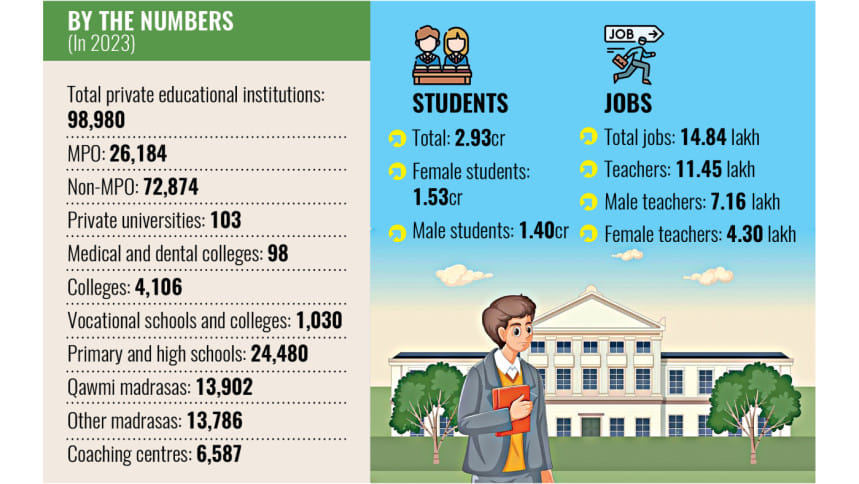Private education sector’s contribution to economy rises: BBS

The private education sector has generated employment at a slow rate, yet its contribution to the economy has risen at a higher rate, according to the latest survey report of the Bangladesh Bureau of Statistics (BBS).
In 2023, the sector's gross output rose by 7.65 percent year-on-year to Tk 85,357 crore, even as employment in the sector grew by only 2.5 percent, the survey data show.
Out of the total jobs, 11.45 lakh were educators—7.16 lakh males and 4.30 lakh females. In other words, around 38 percent of the teachers were female.
Private educational institutions are significant contributors to Bangladesh's education sector. Their presence not only enriches overall prospects for the delivery of education in the country but also plays a vital role in fostering a more prosperous future, the report states.
A total of 2.93 crore students availed themselves of education from private educational institutions in 2023, which was 13 lakh higher than that in the previous year.
Of the students, 1.40 crore were males while 1.53 crore were females, the BBS data show.
In both years, the percentage of female students was slightly higher than that of male students, demonstrating an equitable gender distribution within the educational institutions.
The proportion of female students in medical, dental, nursing, and midwifery colleges was significantly higher in both years.
This higher representation of female students in medical fields could be due to the increasing societal acceptance and encouragement of women pursuing careers in healthcare, says the report.
This could also be due to the fact that women are better equipped to handle the emotional demands of medical service, it states.
The BBS had undertaken a comprehensive nationwide survey on private educational institutions in 2007 with financial and technical assistance from the Asian Development Bank to address data deficiencies regarding the sector.
It has been over 15 years since the last survey was conducted on private educational institutions. In the meantime, the education landscape has evolved, prompting the government to run the survey.
There were 98,980 private educational institutions in the country as of 2023, while the number of coaching centres was 6,587.
A total of 23,637 private educational institutions were being operated under individual ownership, while 10,862 were being run under partnerships.
Meanwhile, the majority, or 49,618 private educational institutions, were being overseen by a board of directors or managing committee.
There were 5,782 institutions under the governance of trustee boards or foundations.
The education sector in the country contributed around 3 percent of the nation's GDP in 2023.
The BBS data show that the share of labour in the gross value added was 38.9 percent in 2022, and it decreased to 37.8 percent in 2023.
The decreasing trend in the share of labour contributing to the GDP indicates that the portion of economic benefits being allocated to workers has reduced.
Instead, a larger share of these gains is flowing towards the owners of the institutions.
This shift suggests an imbalance in the distribution of wealth, where the benefits of economic growth are increasingly favouring those who own the resources over those contributing with their efforts.
As a result, income inequality may increase, potentially leading to decreased consumer spending and a slowdown in economic growth, it notes.

 For all latest news, follow The Daily Star's Google News channel.
For all latest news, follow The Daily Star's Google News channel. 



Comments